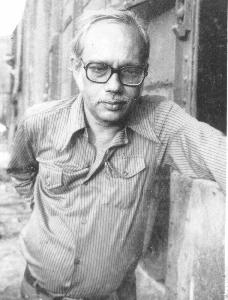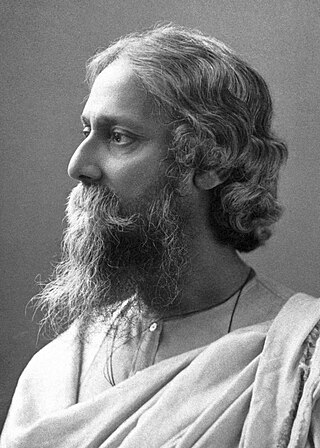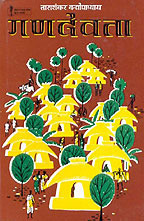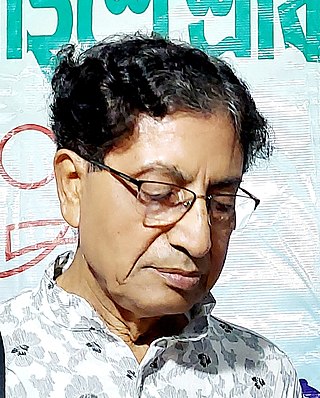Anita Desai, is an Indian novelist and Emerita John E. Burchard Professor of Humanities at the Massachusetts Institute of Technology. She has been shortlisted for the Booker Prize three times. She received the Sahitya Akademi Award in 1978 for her novel Fire on the Mountain, from the Sahitya Akademi, India's National Academy of Literature. She won the Guardian Prize for The Village by the Sea (1983). Her other works include The Peacock, Voices in the City, Fire on the Mountain and an anthology of short stories, Games at Twilight. She is on the advisory board of the Lalit Kala Akademi and a Fellow of the Royal Society of Literature, London. Since 2020 she has been a Companion of Literature.

Shakti Chattopadhyay was an Indian poet and writer who wrote in Bengali. He is known for his realistic depictions of rural life. He was a green poet, many of his poems raised the issue of nature in crisis. Through his poems he urged to protect Mother Nature and plant trees.

Mani Sankar Mukherjee is an Indian writer in the Bengali language, who also served as the Sheriff of Kolkata. He grew up in Hindmotor of West Bengal.

Tarasankar Bandyopadhyay was an Indian novelist who wrote in the Bengali language. He wrote 65 novels, 53-story-books, 12 plays, 4 essay-books, 4 autobiographies, 2 travel stories and composed several songs. He was awarded Rabindra Puraskar, Sahitya Akademi Award, Jnanpith Award, Padma Shri and Padma Bhushan. He was nominated for Nobel Prize in Literature in 1971 and posthumously nominated in 1972.

Bengali literature denotes the body of writings in the Bengali language and which covers Old Bengali, Middle Bengali and Modern Bengali with the changes through the passage of time and dynastic patronization or non-patronization. Bengali has developed over the course of roughly 1,400 years. If the emergence of the Bengali literature supposes to date back to roughly 650 AD, the development of Bengali literature claims to be 1600 years old. The earliest extant work in Bengali literature is the Charyapada, a collection of Buddhist mystic songs in Old Bengali dating back to the 10th and 11th centuries. The timeline of Bengali literature is divided into three periods: ancient (650–1200), medieval (1200–1800) and modern. Medieval Bengali literature consists of various poetic genres, including Hindu religious scriptures, Islamic epics, Vaishnava texts, translations of Arabic, Persian and Sanskrit texts, and secular texts by Muslim poets. Novels were introduced in the mid-19th century. Nobel laureate Rabindranath Tagore is the best known figure of Bengali literature to the world. Kazi Nazrul Islam, notable for his activism and anti-British literature, was described as the Rebel Poet and is now recognised as the National poet of Bangladesh.

Bikash Roy was an Indian actor and filmmaker who is known for his work in Bengali cinema. He is considered as one of the best character artists of india, all time. He has also acted in lead roles in few movies and is well known for his character roles and for his own style of acting in Bengali films from the late 1940s until the mid-1980s.
Shivkumar Joshi was a Gujarati language author from India. He was also stage actor and director. Born in Ahmedabad and lived in Calcutta, he was involved in literary activities. He wrote large number of plays, novels and short stories.

Anila Amrutlal Dalal is Gujarati critic and translator.

Adarsha Hindu Hotel is a Bengali novel written by Bibhutibhushan Bandyopadhyay. The novel was first published in 1940.

Kundanika Kapadia was an Indian novelist, story writer and essayist from Gujarat.

Ramapada Chowdhury was a Bengali-language novelist and short story writer in India. For his novel Bari Badle Jay, he received the Sahitya Akademi Award in 1988. He was also a recipient of the Rabindra Puraskar and several other awards. He won the Rabindranath Tagore Memorial International Prize in its inaugural year. Many of his works have been adapted into films, including the multiple-award-winning Kharij, directed by Mrinal Sen, and Ek Doctor Ki Maut, directed by Tapan Sinha. Chowdhury started writing during the Second World War. He was associated with Anandabazar Patrika for many years, and edited its Sunday supplement. His novels are marked by an economy of expression. He is one of the most well known short story writers in contemporary Bengali literature.

Mandakranta Sen is an Indian poet of Bengali language. She became the youngest ever winner of Ananda Puraskar in 1999 for her very first poetry book. In 2004, she was awarded Sahitya Akademi Golden Jubilee Award for poetry. She quit medical studies to become a full-time writer.

Ganadevata is a 1942 Bengali novel written by Tarasankar Bandyopadhyay. The author received Jnanpith Award in 1966 for this novel. In this novel, Bandyopadhyay narrated the lives of Indian/Bengal villages and lives of the villagers affected by poverty, ignorance and primitive instinct. The novel has been translated into several languages. This novel was filmed as Ganadevata (film) in 1978 by Tarun Majumdar.
Sagar Theke Phera is a Bengali language poetry book written by Premendra Mitra. The book was first published in 1956. Mitra received the Sahitya Akademi Award in 1957 for this work. The book also received Rabindra Puraskar in 1958.

R. Narayana Panickar was an Indian essayist, playwright, translator, lexicographer, novelist and historian of Malayalam. He was credited with over 100 books but the best known among them are the seven-volume work, Kerala Bhasha Sahitya Charitram, a comprehensive history of Malayalam literature up to 1951 and Navayuga Bhasha Nighantu, a lexicon. He also wrote a number of novels and translated several works including Purananuru, Akanaṉūṟu and Silappatikaram. He was also a historian and published works such as Thiruvithamkoor Charitram and Kerala Charitram. Sahitya Akademi honoured him with their annual award in 1955.

Shesh Namaskar is a 1971, Indian, Bengali-language novel that was written by Santosh Kumar Ghosh. The novel, which is considered to be its author's magnum opus, is written in the form of a series of letters from a son to his deceased mother. It won the Sahitya Akademi Award in 1972.
Arogya Niketan is a Bengali drama film directed by Bijoy Bose based on the same name novel of Tarasankar Bandyopadhyay. This film was released on 10 August 1967 under the banner of Aurora Film Corporation. This movie received the 15th National Film Award for Best Feature Film in Bengali.

Tapan Bandopadhyay is an eminent Bengali novelist. He won the Sahitya Akademi Award in 2022 for his novel Birbal.
Asitkumar Bandyopadhyay(3rd June,1920 – 21 March, 2003) was historian of Bengali literature, professor, researcher and former president of Paschimbanga Bangla Akademi. He got famous due to his book Bangla Sahityer Itibritta which is published in nine volumes.














